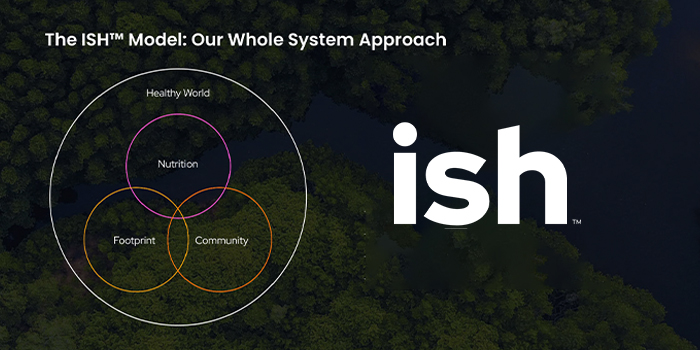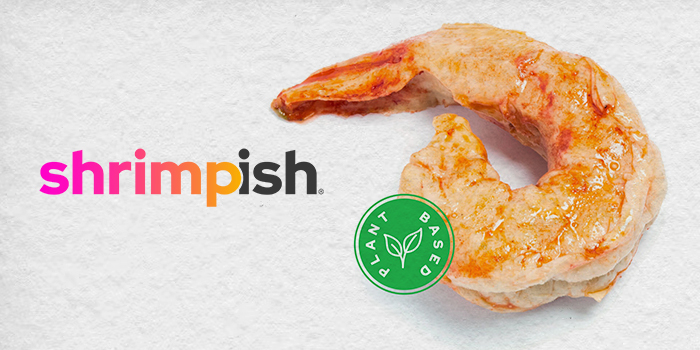ISH Launches With ‘Whole System’ Approach To Alt-Seafood

Alternative seafood brand ISH recently debuted its first product, dubbed Shrimpish, marking another step toward its goal to restructure the food system in pursuit of “a healthier world.” ISH is taking a “whole system” approach to drive improvements in its three core pillars – human health, ecological health, and community health – and believes innovative, sustainable and healthy plant-based products are the way to accomplish that feat.
The Delaware-based company was founded in 2020 by Bernard David, a entrepreneur, educator and author who turned his attention to sustainability two decades ago when he created the Global CO2 Initiative, an investment platform for tech companies addressing the impact of emissions on the atmosphere and oceans. David has been an outspoken advocate for clean energy systems for nearly twenty years, but it wasn’t until he suffered a life-threatening heart attack that he turned his attention to improving the food system.
“[The doctors] basically said, you aren’t going to eat anything but plants for the rest of your life so I asked to see another nutritionist because I wasn’t buying that,” he joked. “But I did end up seeing more than the merits of eating that way and lots of things changed for the better in my body from a health standpoint. [I also] saw that there was a tremendous merit because 25% of the greenhouse gas emissions come from animal agriculture and agriculture in general.”
Initially David planned to invest in a food company that embodied nutrition, community and sustainability at every step in its value chain, but said he was unable to find the right fit and decided to fulfill his vision by creating ISH. The platform uses a scoring system to rank ingredients based on factors like greenhouse gas emissions, energy, water use and “a litany of others” – with the end goal of incorporating the highest ranking ingredients into its products.
“We all should be systems thinkers because we live in a complex world with a bunch of overlaying, and sometimes conflicting, systems,” David said. “When we created the whole system approach, it was done almost from day one: saying how do we look at the food system, systemically?”
This approach was also designed with the world’s growing population, estimated to reach 10 billion by 2050, in mind. David said all food makers should be seeking sustainable ways to feed that population; to that end, he said ISH aims to eventually share its model with other companies to support its overarching goal of using business to create a healthier world.

Launched earlier this year in full-size and crumbled formats, ISH’s debut product Shrimpish is made from regeneratively grown ingredients including green coconut, soy protein and konjac.
The company will initially target foodservice distribution to drive trial and is looking to tap mainstream and flexitarian consumers. According to David, restaurant and on-premise partnerships are the most effective way to reach these audiences with the product, citing that two-thirds of seafood consumption happens outside of the home.
“Seafood is difficult,” he said. “It’s something that has a high cost of failure to consumers… and there’s a lot of confusion amongst consumers as to how to prepare it. But chefs themselves are not intimidated by differences in seafood species.”
ISH also has a variety of other alternative seafood products in its R&D pipeline including plant-based salmon, cod, crab and lobster products and said it has identified over 20 different seafood textures for commercial development.
Eventually, the brand aims to reach all consumers, worldwide and has already begun “adding tentacles into Europe and Asia,” David said. He explained that ISH has already established exclusive co-manufacturing agreements as it looks to “go fast,” “be as light as possible” and “control what we need to control.”
ISH is set to face off against some well-financed competitors in the emerging alt-seafood space. Just last month, alt-tuna maker Current Foods announced the closing of its $18 million seed round to accelerate distribution and expand its product range. Initially self-funded, ISH has since brought on additional investors including Stray Dog Capital, according to a spokesperson for the brand.
In terms of format innovation, China-based OmniFoods is well positioned within international markets with its established plant-based alt-seafood and pork products. Other players like The Plant Based Seafood Company have recently received support stateside to bring products like shrimp, scallops, lobster, oysters and crab cakes to market.
However, David believes that ISH’s comprehensive approach and recent B Corp certification will differentiate the brand as the market continues to grow. ISH is one of the only alternative seafood makers that has received the certification.
“We feel like we’ve just joined this elite group that’s really focused on [using] business as a force for good,” David concluded.

















